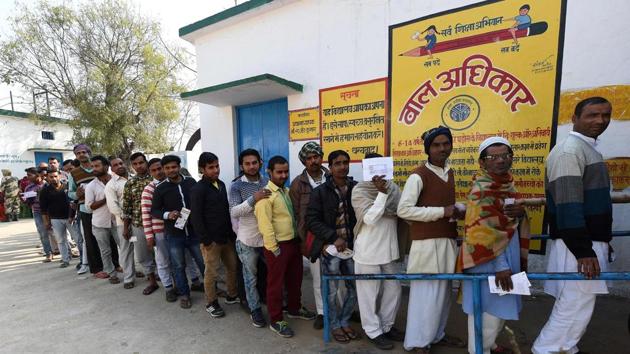UP elections: 64.2% voting in first phase, Mayawati talks of pro-BSP wave
An estimated 64.2% voter turnout was recorded in 73 assembly constituencies in Uttar Pradesh on Saturday in the first phase of polling considered crucial in determining results in the country’s most populous state.
An estimated 64.2% voter turnout was recorded in 73 assembly constituencies in Uttar Pradesh on Saturday in the first phase of polling considered crucial in determining results in the country’s most populous state. (HIGHLIGHTS OF THE DAY)

The Election Commission said the figure was calculated at 5pm.
The high turnout is believed to be because of heavy polling in Jat- and Muslim-dominated areas of the 15 western UP districts, perceived to be a stronghold of the Bahujan Samaj Party (BSP).
The region had recorded 59.6% voting in the 2012 assembly elections that witnessed Samajwadi Party (SP) making a dent into the BSP vote base, riding on a surge in support for its young leader Akhilesh Yadav. The party had then won as many as 24 seats.
In the 2014 Lok Sabha elections, the BJP bagged all the parliamentary seats in the region with the Jat community voting overwhelmingly for it. But this time around, the Jats are reportedly upset with the party.
The community is demanding reservation in jobs and education in neighbouring Haryana, where the BJP is in power. The stir could have reflection on the UP polls.
Of all the major players, BSP chief Mayawati has the largest stake in the region that has a large presence of Muslim, Jat and Dalit voters. Her party is in a sticky wicket in eastern Uttar Pradesh and has limited presence in the central region.
The BSP will have to make a sweep in the region -- as it did in 2007 – to make up for its limitations in areas that will go to the polls in the remaining phases.
If the BSP emerges the first choice of Muslims in this region, it might create a momentum in the party’s favour in the next six rounds, political analysts said.
Muslims and Dalits together constitute 40% of the state’s population. And four-time chief minister Mayawati has been aggressively wooing them, giving 97 seats to Muslim and 87 to Dalit candidates.
“There is a pro-BSP wave in the state. We are getting positive response in the first round of polling,” Mayawati said in Lucknow.
The region doesn’t have a significant population of Yadavs, the mainstay of the ruling SP, which is contesting the elections in alliance with the Congress.
The coalition is eyeing Muslim voters, who constitute 19.26% of the state’s 200 million population and are numerically stronger in many districts that voted on Saturday. Around 41% in Muzaffarnagar, including Shamli that was separated post-census, 25% in Ghaziabad, and 20% in Aligarh.
Besides, the SP is hoping that chief minister Akhilesh Yadav and Congress vice president Rahul Gandhi, who have addressed joint rallies, will bring dividend for the party.
The BJP is banking on an assortment of castes and sub-castes among others to do well in the UP elections, also seen as a key test for Narendra Modi halfway into his first term as Prime Minister.
The BJP’s best hope, analysts said, lies in a split in Muslim votes between the BSP and the Congress-SP combine and polarisation of Hindu votes in its favour.
Union HRD minister Prakash Javadekar, quoting a BJP survey, said the party will win more than 50 seats in the region and will get a “big mandate” in the state.
Several of these 15 districts witnessed social tension in the past couple of years leading to communal riots in Muzaffarnagar, killing of a man in Dadri on the suspicion of slaughtering a cow for a family feast, and allegations of migration of Hindu families from Muslim-majority Kairana.
Of the 73 seats, the BSP and the SP won 24 each in the 2012 assembly elections. The BJP got 11 seats, the Rashtriya Lok Dal of Ajit Singh took nine and the Congress bagged five.




